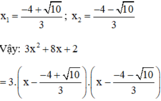
Hãy nhập câu hỏi của bạn vào đây, nếu là tài khoản VIP, bạn sẽ được ưu tiên trả lời.


\(=2\left(x^2+x-5\right)^2-5\left(x^2+x-5\right)+3\)
\(=2\left(x^2+x-5\right)-2\left(x^2+x-5\right)-3\left(x^2+x-5\right)+3\)
\(=2\left(x^2+x-5\right)\left(x^2+x-6\right)-3\left(x^2+x-6\right)\)
\(=\left(x^2+x-6\right)\left(2x^2+2x-13\right)\)
\(=\left(x-2\right)\left(x+3\right)\left(2x^2+2x-13\right)\)
\(C=2\left(x^2+x-5\right)^2-5\left(x^2+x\right)+28\)
Đặt t=\(x^2+x\)
\(\Rightarrow C=2\left(t-5\right)^2-5t+28=2t^2-20t+50-5t+28=2t^2-25t+78=2\left(t-\dfrac{13}{2}\right)\left(t-6\right)\)
Thay t: \(C=2\left(t-\dfrac{13}{2}\right)\left(t-6\right)=2\left(x^2+x-\dfrac{13}{2}\right)\left(x^2+x-6\right)=2\left(x-2\right)\left(x+3\right)\left(x^2+x-\dfrac{13}{2}\right)\)



Ta có: \(a\left(b^3-c^3\right)+b\left(c^3-a^3\right)+c\left(a^3-b^3\right)\)
\(=a\left(b-c\right)\left(b^2+bc+c^2\right)+bc^3-a^3b+a^3c-b^3c\)
\(=a\left(b-c\right)\left(b^2+bc+c^2\right)-bc\left(b-c\right)\left(b+c\right)-a^3\left(b-c\right)\)
\(=\left(b-c\right)\left(ab^2+abc+c^2a-b^2c-bc^2-a^3\right)\)
\(=\left(b-c\right)\left[c^2\left(a-b\right)-a\left(a-b\right)\left(a+b\right)+bc\left(a-b\right)\right]\)
\(=\left(a-b\right)\left(b-c\right)\left(c^2-a^2-ab+bc\right)\)
\(=\left(a-b\right)\left(b-c\right)\left[\left(c-a\right)\left(c+a\right)+b\left(c-a\right)\right]\)
\(=\left(a-b\right)\left(b-c\right)\left(c-a\right)\left(a+b+c\right)\)


a: \(A=x\sqrt{x}-y\sqrt{y}+x\sqrt{y}-y\sqrt{x}\)
\(=\left(\sqrt{x}-\sqrt{y}\right)\left(x+\sqrt{xy}+y\right)+\sqrt{xy}\left(\sqrt{x}-\sqrt{y}\right)\)
\(=\left(\sqrt{x}-\sqrt{y}\right)\left(\sqrt{x}+\sqrt{y}\right)^2\)
b: \(B=5x^2-7x\sqrt{y}+2y\)
\(=5x^2-5x\sqrt{y}-2x\sqrt{y}+2y\)
\(=5x\left(x-\sqrt{y}\right)-2\sqrt{y}\left(x-\sqrt{y}\right)\)
\(=\left(x-\sqrt{y}\right)\left(5x-2\sqrt{y}\right)\)

* Chứng minh:
Phương trình a x 2 + b x + c = 0 có hai nghiệm x 1 ; x 2
⇒ Theo định lý Vi-et: 
Khi đó : a.(x – x1).(x – x2)
= a.(x2 – x1.x – x2.x + x1.x2)
= a.x2 – a.x.(x1 + x2) + a.x1.x2
= 
= a . x 2 + b x + c ( đ p c m ) .
* Áp dụng:
a) 2 x 2 – 5 x + 3 = 0
Có a = 2; b = -5; c = 3
⇒ a + b + c = 2 – 5 + 3 = 0
⇒ Phương trình có hai nghiệm 
Vậy: 
b) 3 x 2 + 8 x + 2 = 0
Có a = 3; b' = 4; c = 2
⇒ Δ ’ = 4 2 – 2 . 3 = 10 > 0
⇒ Phương trình có hai nghiệm phân biệt:

Cái này là phân tích thành nhân tử hay tính z
như đề ạ